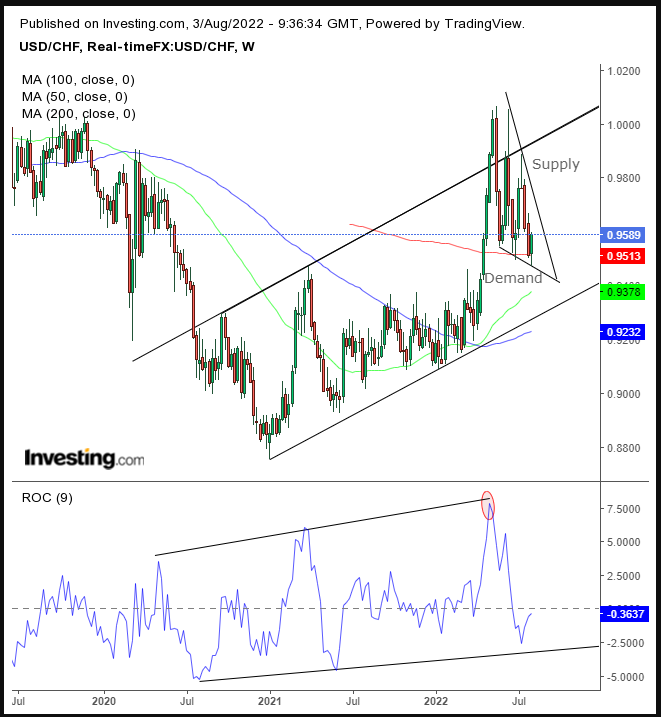The Swiss franc has gained against the dollar for the past three months, the longest stretch since 2020.
The rally began in May as spiking volatility in global financial markets sent investors into havens. The dollar had already appreciated since June 2021—when the Fed turned hawkish and finally acknowledged that US inflation may persist—so traders sought to diversify risk even within their havens.
Traders also thought that the dollar may have already priced in Fed tightening so they looked to the Swiss currency. At the time I warned about buying into the narrative of an exhausted greenback as it was unlikely to persist.
The Swiss franc kept gaining after Swiss prices jumped 2.9% June compared to the over 8% in the eurozone and the UK. But this was high compared to Switzerland's historically low inflation. And then in July, the Consumer Price Index there climbed 3.4%, increasing the pressure on the SNB to act.
This narrative should boost the CHF vs USD, but I'm going to make the case in favor of the opposite.
Remember, the Fed began quantitative tightening on an unprecedented scale this year and in an extended market crash funds would move back into dollars, as they did in 2007-8.
Technically, the dollar is showing signs of reversals against havens, such as gold, the yen, and the Swiss franc.

Having hit the resistance of a price range, traders began shorting the Swissy.
This range goes back to Jan. 2015, when the SNB shocked markets by removing its cap on the franc at 1.20 euros and lowered its interest rates to negative 0.75%. This unexpectedly drastic decision propelled the CHF up to 39% instantaneously.
While it is true that the USD/CHF has been declining since mid-May, I suspect short sellers are growing weary.
The trading pattern has been developing a falling wedge. This structure shows that while both highs and lows are falling, they are doing so at a distinctively different pace.
After a six-week gain in its longest winning streak since May 2018, the dollar entered declining congestion versus the franc, leading some to think that the dollar was grossly overpriced. You can see the ROC spiking as the price appeared to overextend itself from its tempered rising channel.
Short sellers began to continuously lower their offers in compromise to reflect their growing confidence that they would still make money with constantly falling prices. However, while buyers did get pushed back somewhat by the onslaught of supply, they have mostly retained their position compared to sellers.
If the price breaks to the topside, we will have evidence that the balance reversed and demand outpaced supply. Short sellers would presumably cover, reducing supply and increasing demand, adding to that of buyers. The breakout is expected to put the pair in a chain reaction of covered shorts and triggered longs, which will also attract the undecided. Most of the market will be on the demand side at this point, propelling prices higher.
Note, the dollar found support by the 200-week MA, bouncing back above it for the second time since the week starting Jun, after seeing support by the major MA in May. Also, the 50 WMA crossed above the 100 WMA. At the same time, it found support from the rising channel bottom and is now heading toward a weekly Golden Cross.
Note how the falling wedge fits into the rising channel and how the ROC fits into its own.
Trading Strategies
Conservative traders should wait for an obvious upside breakout, with at least a three-day (preferably to include a Friday close), 3% penetration, on a closing basis, before risking a long position.
Moderate traders would wait for the same pattern completion but would be content with a two-day, 2% breakout on a closing basis.
Aggressive traders could either wait for the dollar to near the pattern bottom, at the 95 areas, or for a 1% upside breakout on a closing basis.
A trading plan is crucial to incorporate your timing, budget, and temperament. However, I understand if you don't know how to do that yet. Here's a generic example. Just keep in mind that it's for practice until you learn how to develop customized plans, which would provide you with optimized results on a statistical basis.
Trade Sample 1 - Aggressive Long Position on Bounce:
- Entry: 94.50
- Stop-Loss: 94.00
- Risk: 50 pips
- Target: 96.00
- Reward: 150 pips
- Risk-Reward Ratio: 1:3
Trade Sample 2 - Aggressive Long Position After Breakout
- Entry: 96.00 (after the filtered breakout, per strategy)
- Stop-Loss: 95.00
- Risk: 100 pips
- Target: 99.00
- Reward: 300 pips
- Risk-Reward Ratio: 1:3
